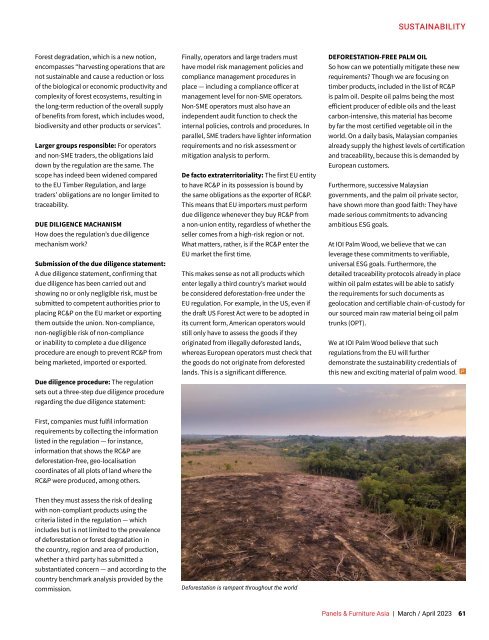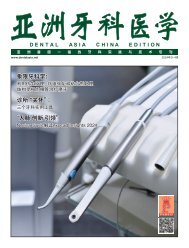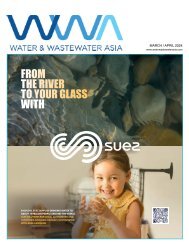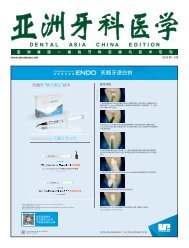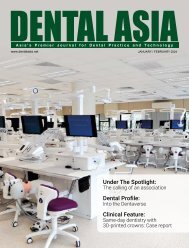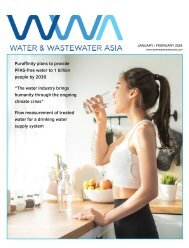Panels & Furniture Asia March/April 2023
Panels & Furniture Asia (PFA) is a leading regional trade magazine dedicated to the woodbased panel, furniture and flooring processing industry. Published bi-monthly since 2000, PFA delivers authentic journalism to cover the latest news, technology, machinery, projects, products and trade events throughout the sector. With a hardcopy and digital readership comprising manufacturers, designers and specifiers, among others, PFA is the platform of choice for connecting brands across the global woodworking landscape.
Panels & Furniture Asia (PFA) is a leading regional trade magazine dedicated to the woodbased panel, furniture and flooring processing industry. Published bi-monthly since 2000, PFA delivers authentic journalism to cover the latest news, technology, machinery, projects, products and trade events throughout the sector. With a hardcopy and digital readership comprising manufacturers, designers and specifiers, among others, PFA is the platform of choice for connecting brands across the global woodworking landscape.
Create successful ePaper yourself
Turn your PDF publications into a flip-book with our unique Google optimized e-Paper software.
SUSTAINABILITY<br />
Forest degradation, which is a new notion,<br />
encompasses “harvesting operations that are<br />
not sustainable and cause a reduction or loss<br />
of the biological or economic productivity and<br />
complexity of forest ecosystems, resulting in<br />
the long-term reduction of the overall supply<br />
of benefits from forest, which includes wood,<br />
biodiversity and other products or services”.<br />
Larger groups responsible: For operators<br />
and non-SME traders, the obligations laid<br />
down by the regulation are the same. The<br />
scope has indeed been widened compared<br />
to the EU Timber Regulation, and large<br />
traders’ obligations are no longer limited to<br />
traceability.<br />
DUE DILIGENCE MACHANISM<br />
How does the regulation’s due diligence<br />
mechanism work?<br />
Submission of the due diligence statement:<br />
A due diligence statement, confirming that<br />
due diligence has been carried out and<br />
showing no or only negligible risk, must be<br />
submitted to competent authorities prior to<br />
placing RC&P on the EU market or exporting<br />
them outside the union. Non-compliance,<br />
non-negligible risk of non-compliance<br />
or inability to complete a due diligence<br />
procedure are enough to prevent RC&P from<br />
being marketed, imported or exported.<br />
Due diligence procedure: The regulation<br />
sets out a three-step due diligence procedure<br />
regarding the due diligence statement:<br />
Finally, operators and large traders must<br />
have model risk management policies and<br />
compliance management procedures in<br />
place — including a compliance officer at<br />
management level for non-SME operators.<br />
Non-SME operators must also have an<br />
independent audit function to check the<br />
internal policies, controls and procedures. In<br />
parallel, SME traders have lighter information<br />
requirements and no risk assessment or<br />
mitigation analysis to perform.<br />
De facto extraterritoriality: The first EU entity<br />
to have RC&P in its possession is bound by<br />
the same obligations as the exporter of RC&P.<br />
This means that EU importers must perform<br />
due diligence whenever they buy RC&P from<br />
a non-union entity, regardless of whether the<br />
seller comes from a high-risk region or not.<br />
What matters, rather, is if the RC&P enter the<br />
EU market the first time.<br />
This makes sense as not all products which<br />
enter legally a third country’s market would<br />
be considered deforestation-free under the<br />
EU regulation. For example, in the US, even if<br />
the draft US Forest Act were to be adopted in<br />
its current form, American operators would<br />
still only have to assess the goods if they<br />
originated from illegally deforested lands,<br />
whereas European operators must check that<br />
the goods do not originate from deforested<br />
lands. This is a significant difference.<br />
DEFORESTATION-FREE PALM OIL<br />
So how can we potentially mitigate these new<br />
requirements? Though we are focusing on<br />
timber products, included in the list of RC&P<br />
is palm oil. Despite oil palms being the most<br />
efficient producer of edible oils and the least<br />
carbon-intensive, this material has become<br />
by far the most certified vegetable oil in the<br />
world. On a daily basis, Malaysian companies<br />
already supply the highest levels of certification<br />
and traceability, because this is demanded by<br />
European customers.<br />
Furthermore, successive Malaysian<br />
governments, and the palm oil private sector,<br />
have shown more than good faith: They have<br />
made serious commitments to advancing<br />
ambitious ESG goals.<br />
At IOI Palm Wood, we believe that we can<br />
leverage these commitments to verifiable,<br />
universal ESG goals. Furthermore, the<br />
detailed traceability protocols already in place<br />
within oil palm estates will be able to satisfy<br />
the requirements for such documents as<br />
geolocation and certifiable chain-of-custody for<br />
our sourced main raw material being oil palm<br />
trunks (OPT).<br />
We at IOI Palm Wood believe that such<br />
regulations from the EU will further<br />
demonstrate the sustainability credentials of<br />
this new and exciting material of palm wood. P<br />
First, companies must fulfil information<br />
requirements by collecting the information<br />
listed in the regulation — for instance,<br />
information that shows the RC&P are<br />
deforestation-free, geo-localisation<br />
coordinates of all plots of land where the<br />
RC&P were produced, among others.<br />
Then they must assess the risk of dealing<br />
with non-compliant products using the<br />
criteria listed in the regulation — which<br />
includes but is not limited to the prevalence<br />
of deforestation or forest degradation in<br />
the country, region and area of production,<br />
whether a third party has submitted a<br />
substantiated concern — and according to the<br />
country benchmark analysis provided by the<br />
commission.<br />
Deforestation is rampant throughout the world<br />
<strong>Panels</strong> & <strong>Furniture</strong> <strong>Asia</strong> | <strong>March</strong> / <strong>April</strong> <strong>2023</strong> 61


